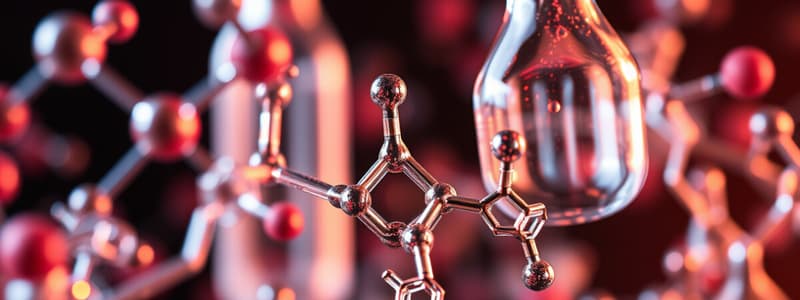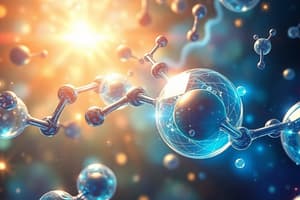Podcast
Questions and Answers
Biochemical reactions are not catalyzed by enzymes.
Biochemical reactions are not catalyzed by enzymes.
False (B)
What are the four main classes of biomolecules?
What are the four main classes of biomolecules?
Proteins, carbohydrates, lipids, and nucleic acids.
Which of the following is NOT classified as a biomolecule?
Which of the following is NOT classified as a biomolecule?
- Lipids
- Carbohydrates
- Proteins
- Water (correct)
What are the principal elements that living organisms are composed of?
What are the principal elements that living organisms are composed of?
What do proteins perform by interacting with other molecules?
What do proteins perform by interacting with other molecules?
Cells are the basic units of living organisms, which differ widely in structure and function, and are surrounded by a __________.
Cells are the basic units of living organisms, which differ widely in structure and function, and are surrounded by a __________.
Life is described in operational terms. Which of the following is one of these descriptions?
Life is described in operational terms. Which of the following is one of these descriptions?
DNA mutations can contribute to increased adaptability of organisms.
DNA mutations can contribute to increased adaptability of organisms.
What type of molecules are biomolecules?
What type of molecules are biomolecules?
Which macromolecule is formed from nucleotides?
Which macromolecule is formed from nucleotides?
Flashcards are hidden until you start studying
Study Notes
What is Life
-
Life encompasses a vast array of diversity, making its definition complex.
-
Operational descriptions include movement, reproduction, adaptation, and response to stimuli.
-
Biochemistry reveals that all organisms adhere to universal chemical and physical laws.
-
Enzymes catalyze biochemical reactions essential for life.
-
Life is characterized as complex and dynamic:
- All organisms consist of six primary elements: carbon, nitrogen, oxygen, hydrogen, sulfur, and phosphorus.
- Biomolecules are carbon-based organic molecules produced by living organisms.
-
Life is organized:
- Living systems consist of cells, from simple atoms to complex organs.
- Biomolecules combine to form polymers known as macromolecules, including:
- Nucleic acids from nucleotides
- Proteins from amino acids
- Polysaccharides from monosaccharides
-
Life is cellular:
- Cells, the foundational units of life, are membrane-bound structures that regulate transport.
- Significant structural and functional diversity exists among different cell types.
-
Life is information-based:
- Genetic information is encoded in DNA genes, directing amino acid sequences in proteins.
- Proteins assume specific 3D structures and interact with other molecules, exemplified by insulin binding to its receptors, signaling glucose uptake.
-
Life adapts and evolves:
- DNA mutations can enhance an organism's survival and adaptability to new environments, influencing energy utilization and reproductive success.
Biomolecules
-
Biomolecules are organic (carbon-based) compounds synthesized by living organisms, classified into:
- Proteins
- Carbohydrates
- Lipids
- Nucleic acids
-
Hundreds of enzyme-catalyzed biochemical reactions form biochemical pathways essential for sustaining life.
-
Organisms consist of both organic and inorganic molecules, primarily made of 6 essential elements:
- Carbon (C)
- Hydrogen (H)
- Oxygen (O)
- Nitrogen (N)
- Phosphorus (P)
- Sulfur (S)
-
Important trace elements include sodium (Na+), potassium (K+), magnesium (Mg2+), and calcium (Ca2+).
Studying That Suits You
Use AI to generate personalized quizzes and flashcards to suit your learning preferences.




